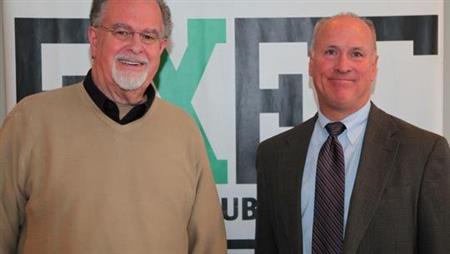
Published December 4, 2021 (click here to read the newspaper article or read below)
Tom Gouttierre former Dean of International Studies and Programs at the University of Nebraska-Omaha and director of the Center for Afghanistan Studies addresses the Executive Club in Lincoln.
After the fall of Afghanistan to the Taliban this past summer, you can understand the frustration of someone who toiled in the country as a Peace Corps volunteer, Fulbright fellow and then Fulbright Foundation director for almost 10 years through the 1960s and ‘70s, and then advised six different U.S. presidents after that on how to work with the Afghans to help modernize and stabilize the country.
To a certain extent Tom Gouttierre, former dean of International Studies and Programs at the University of Nebraska-Omaha and director of the Center for Afghanistan Studies, serving from 1974 until his retirement in 2015, feels like it was all for naught.
“I was very angry with the way our presidents have handled this. There are a lot of good inside advisers, and I was an outside adviser,” said Gouttierre, who served as a senior political affairs officer for the U.S. State Department on the United States Peacekeeping Mission to Afghanistan in 1996 and 1997. “But, at the top we had people who didn’t understand what we had to do to be successful in the long term in Afghanistan.”
Gouttierre, who is widely regarded as one of the leading experts on Afghanistan and U.S.-Afghan relations in the Western Hemisphere, spoke Monday to Executive Club members at their weekly luncheon at the Hilton Garden Inn in downtown Lincoln. He has been a regular in making presentations and informing the club about issues in the Middle East since the early 2000s.
In speaking to the final capitulation by the U.S. to the Taliban, Gouttierre referred to meetings dating back to the winter of 2020.
“Back in February of 2020, (Secretary of State) Mike Pompeo signed off on an agreement in Doha (Qatar) with the Taliban to pull out unilaterally from Afghanistan. Then, under the watch of President Joe Biden, we had an unconditional retreat and abandonment of our allies, both in NATO and Afghanistan against the Taliban.”
Gouttierre’s disappointment in the U.S. leadership was not left to just the present administration and the immediate past, but to all those seeking his advisement in the Middle East since the 1970s.
“We’ve had six presidents who have mismanaged everything in Afghanistan and the region, saying that we couldn’t stay there because things weren’t going to work out,” said Gouttierre, who retired from UNO in 2015, but did not take his vision away from what was happening overseas. “It takes a long time to stabilize a country that sits between Pakistan and Iran. It wasn’t going to happen in the time of 20 years.”
Gouttierre compared that time frame to other U.S. conflicts and wars, and pondered whether they had ever actually ended.
“There was a lot of postulation that this (Afghanistan) was America’s longest war, but comparing it to Korea, I ask, has that war or conflict ever ended? We still worry about bombs coming from North Korea, and we have 100,000 troops in South Korea and Japan,” he said before making reference to post World War II pacts. “And, what about the 150,000 troops we have in Western Europe to this day, making sure that Greece and Italy don’t succumb to the communist threat according to the Marshall Plan.”
“We’re seeing need right now in our community,” he says, “at all levels. Children, adults, families, they are all experiencing need right now. Even the nonprofits trying to help them are experiencing need.”
In reflecting back to the Afghanistan he first set eyes on in the 1960s, Gouttierre was incredulous about how far the government had come in this short time.
“They have made tremendous strides in modernizing and with development systems of government. They have made a constitution. They had a series of elections that were certified by the UN (United Nations),” he said. “We’d asked the Afghans to help us (U.S.) drive out Al Qaeda and the Taliban after 9/11, and then we abandon them.”
Gouttierre’s frustration with the current situation in Afghanistan was illustrated by those who now are left in charge of governing the country.
“Two weeks ago, I saw this interview with a member of the Taliban who was appointed as the minister of public works, and he was questioned by the interviewer about how he was managing things in his new duties. He said, ‘I really don’t want to be here. I’d rather be back as a jihadi fighting. I don’t know anything about managing. I’ve never been engaged in managing.’ None of these jihadists have ever been placed in this position. So, these are the Taliban who are in control of Afghanistan.”
Gouttierre best describes the Taliban as a foreign force that is nomadic in nature, mostly residing in Pakistan, and is primarily funded by oil money emanating from the Persian Gulf region.